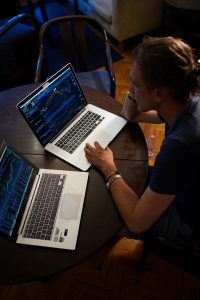Forex trading has gained immense popularity in recent years, with millions of traders worldwide participating in the market. The forex market is the largest and most liquid financial market in the world, with an average daily trading volume of over $5 trillion. As a result, many individuals are interested in becoming forex brokers to take advantage of the growing demand for forex trading services. If you are one of those individuals, this article will provide you with an in-depth guide on how to become a forex broker.
1. Understand the Forex Market
The first step to becoming a forex broker is to understand the forex market. It is essential to learn how the market works and the various factors that can impact currency prices. You can educate yourself on the forex market by reading books, attending seminars, and taking online courses.
2. Choose a Brokerage Business Model
Once you have a good understanding of the forex market, the next step is to choose a brokerage business model. There are two primary types of brokerage models:
a) Market Maker – In this model, the broker takes the opposite side of the client’s trade. The broker creates a market by setting the bid and ask prices for each currency pair. The broker makes money by earning the spread, which is the difference between the bid and ask prices.
b) Straight Through Processing (STP) – This model is also known as an agency model. In this model, the broker acts as an intermediary between the client and the liquidity provider. The broker earns a commission on each trade executed on behalf of the client.
3. Register Your Business
The next step is to register your forex brokerage business. You will need to choose a business name, register the business with the relevant government agency, and obtain the necessary licenses and permits. Depending on your location, you may need to register with the Securities and Exchange Commission (SEC) or the Commodity Futures Trading Commission (CFTC) in the United States. You may also need to register with the Financial Conduct Authority (FCA) in the United Kingdom or other regulatory bodies in other countries.
4. Choose a Trading Platform
Choosing a trading platform is crucial to the success of your forex brokerage business. A trading platform is a software application that allows traders to access the forex market and execute trades. There are several trading platforms available in the market, including MetaTrader 4 (MT4), MetaTrader 5 (MT5), cTrader, and NinjaTrader. You need to choose a trading platform that is reliable, user-friendly, and offers the necessary features and functionalities.
5. Partner with a Liquidity Provider
To offer trading services to your clients, you need to partner with a liquidity provider. A liquidity provider is a financial institution that provides liquidity to the forex market. Liquidity providers offer access to the interbank market, where banks and other financial institutions trade currencies. When you partner with a liquidity provider, you can offer your clients competitive spreads and fast execution speeds.
6. Set Up Your Website
Your website is the face of your forex brokerage business. It is essential to have a professional-looking website that is easy to navigate and offers all the necessary information about your services. Your website should have a user-friendly interface, provide real-time market data, and offer different account types to cater to the needs of different traders.
7. Build a Marketing Strategy
Marketing is crucial to the success of your forex brokerage business. You need to develop a marketing strategy that will attract traders to your platform. Some marketing strategies you can consider include SEO, social media marketing, email marketing, and paid advertising.
8. Provide Excellent Customer Support
Providing excellent customer support is essential to retaining your clients and building a loyal customer base. You need to offer 24/7 customer support and have a team of knowledgeable and friendly staff who can assist traders with any issues they may encounter.
Conclusion
Becoming a forex broker requires a significant investment of time, effort, and resources. However, if done correctly, it can be a lucrative and rewarding business venture. By following the steps outlined in this article, you can start your forex brokerage business and offer trading services to traders worldwide. Remember to stay up to date with the latest market trends and regulations to ensure your business remains competitive and compliant.





